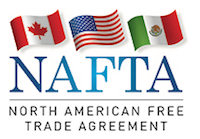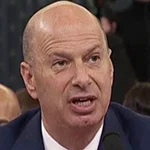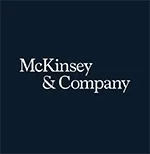A score of U.S.-based trade organizations have retained Capitol Hill representation in recent weeks amid ongoing attempts by the Trump administration to renegotiate terms of the North American Free Trade Agreement.
The American Petroleum Institute, the Toy Industry Association, the American Feed Industry Association, the Consumer Technology Association, candy group the National Confectioners Association, and the national organization of American wineries, WineAmerica, are some of the associations representing the U.S. private sector that have hired lobbying counsel to advocate in D.C. on their behalf in response to Trump's insistence of a renegotiated NAFTA agreement, according to lobbying registration documents obtained by O’Dwyer’s.
The move comes as leaders from the United States, Canada and Mexico host a series of meetings throughout the year in a bid to address concerns and resolve issues related to the historic 1994 trade accord.
 |
Lobbying firms listed in these pacts include The Garrison Group, SLK Strategies and Capitol Legislative Strategies, among others.
President Trump, who has long seen NAFTA as deleterious to U.S. manufacturing jobs — once referring to the agreement as “the worst trade deal maybe ever signed anywhere” — has vowed to rework some of the accord’s terms, even threatening at times to remove the U.S. from the agreement altogether.
The possibility of a NAFTA pullout has some U.S. business leaders panicked, with several U.S. corporations following trade groups’ lead and retaining lobbying representation to represent them on Capitol Hill.
Starbucks in September signed a pact with McGuireWoods public affairs unit McGuireWoods Consulting on NAFTA-related tax and trade matters. The Seattle-based coffee giant, which maintains more than 600 locations throughout Mexico, now acquires a large amount of its coffee from Mexican producers, and even established a production support center in the southern Mexican state of Chiapas last year.
Whirlpool Corporation is another U.S. company in recent weeks to appoint lobbying counsel in response to the development, inking an agreement with Akin Gump Strauss Hauer & Feld to advocate in Washington on behalf of NAFTA-related issues.
The Benton Harbor, MI-based home appliance manufacturer, which markets Whirlpool, Maytag, KitchenAid, Jenn-Air and other household brands, drew criticism in 2009 when it shuttered a plant in Evansville, Indiana and moved production of some of its refrigerators to Mexico.
The Fortune 500 company, which maintains manufacturing facilities in the Mexican cities of Monterrey, Ramos Arizpe and Celaya, in 2014 moved production of some of its commercial front-load washing machines from Mexico to a plant in Clyde, Ohio, allegedly in a bid to save on shipping costs to U.S. consumers, who comprise an overwhelming majority of that product’s audience.
In July, the Trump administration said it wanted to reduce the United States’ trade deficit and bolster domestic manufacturing by increasing NAFTA’s rules of origin percentages, removing provisions that prevent the U.S. from imposing import restrictions on Canadian and Mexican goods. Trump has also pushed for improved patent and copyright protections, as well as raising Mexico’s labor and environmental standards. Trump has said that he wants a renewed agreement completed by the end of the year.
Trade between the United States, Canada and Mexico was more than $1.1 trillion in 2016, according to Council on Foreign Relations estimates.


 Missy Edwards Strategies represents Shein Technology Group, the Los Angeles arm of the embattled Singapore-based “instant fashion” retailer.
Missy Edwards Strategies represents Shein Technology Group, the Los Angeles arm of the embattled Singapore-based “instant fashion” retailer. Carlsbad, a north San Diego County city of 115K people, is looking for a firm to provide government relations and Sacramento lobbying services.
Carlsbad, a north San Diego County city of 115K people, is looking for a firm to provide government relations and Sacramento lobbying services. Gordon Sondland, who was US ambassador to the European Union under Donald Trump, has registered as a representative of Ukraine’s cabinet and ministers.
Gordon Sondland, who was US ambassador to the European Union under Donald Trump, has registered as a representative of Ukraine’s cabinet and ministers. The Daschle Group is representing Santa Monica-based Stand with Hong Kong Action, an advocacy group that fights to end Chinese repression in Hong Kong.
The Daschle Group is representing Santa Monica-based Stand with Hong Kong Action, an advocacy group that fights to end Chinese repression in Hong Kong. McKinsey & Co. has reached out to Republican shop Harbinger Strategies to educate policymakers about the activities of the embattled management consultancy.
McKinsey & Co. has reached out to Republican shop Harbinger Strategies to educate policymakers about the activities of the embattled management consultancy.


 Have a comment? Send it to
Have a comment? Send it to 
No comments have been submitted for this story yet.